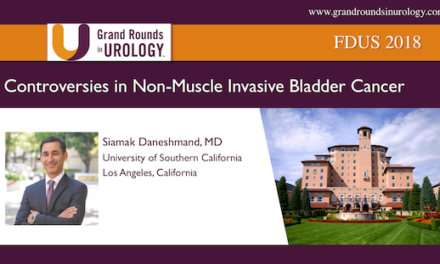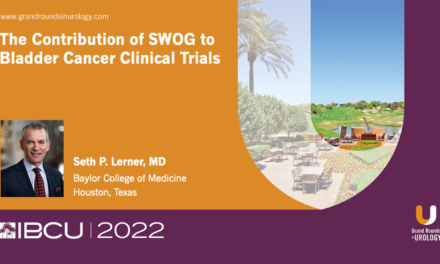Joshua J. Meeks, MD, PhD, presented “Bladder Cancer Risk Stratification: Moving from the Old to the New” at the 6th International Bladder Cancer Update on November 19, 2022, in Scottsdale, Arizona.
How to cite: Meeks, Joshua J. “Bladder Cancer Risk Stratification: Moving from the Old to the New” November 2022. Accessed Jul 2025. https://grandroundsinurology.com/bladder-cancer-risk-stratification-moving-from-the-old-to-the-new/
Bladder Cancer Risk Stratification: Moving from the Old to the New – Summary
Joshua J. Meeks, MD, PhD, Associate Professor of Urology, Biochemistry and Molecular Genetics at the Northwestern University Feinberg School of Medicine in Chicago, Ill, discusses non-muscle-invasive bladder cancer (NMIBC) risk stratification, explaining that major differences in recurrence and progression occur by grade, stage, focality, and the presence of carcinoma in situ (CIS). He addresses American Urological Association (AUA) risk stratification and briefly describes data associated with each risk category before delving into each category. In low-risk patients, Dr. Meeks explains that while the risk of recurrence is high at ~50 percent at three years, the risk of progression is negligible; he emphasizes the value of giving intravesical therapy at the time of transurethral resection (TUR) as well as office-based fulguration (diathermy) for small recurrent tumors. He explains it’s best for the low-risk patient to undergo less frequent cystoscopy and to avoid Bacillus Calmette-Guerin (BCG) and cystologies, calling these unhelpful and unnecessary for these patients. Dr. Meeks then turns to intermediate-risk patients, who he describes as either low-grade patients with recurrence or as patients with small high-grade tumors. He explains there is some controversy since these two phenotypes are combined in this intermediate-risk area, characterizing this category as heterogeneous. Dr. Meeks advises practitioners to begin with intravesical therapy or chemotherapy and explains that patients usually get a cystoscopy every three months for two years and describes cytology as helpful for these patients. He goes on to illustrate a new intermediate risk classification that attempts to dissect this heterogeneous, intermediate-risk group more effectively by further separating that group according to the number of risk factors a patient has, such as multiple tumors, early recurrence (<one year), frequent recurrence (>one year), tumor size (>three centimeters), and whether previous intravesical treatment has succeeded or failed. Dr. Meeks then turns to high-risk patients, who he says are totally different since these are the most worrisome patients as far as progression; this group includes those with CIS, T1s, large TaHG, all variants, and those with lymphovascular invasion (LVI). For these patients, intravesical therapy includes induction BCG and maintenance for 36 months (if possible), cystoscopy every three months for two years, cytology, and yearly imaging. He addresses patients with CIS, calling this a special case of high-risk NMIBC and highlighting that blue light cystoscopy (BLC) can be helpful for these patients. Dr. Meeks cites data on CIS patient response rates to BCG, concluding that CIS results in an independently worse outcome. He cites the European Association of Urology’s (EAU) updated risk groups, which now include a “very-high-risk” category, before turning to the role of systemic therapy, explaining that data from three randomized trials is forthcoming. Dr. Meeks summarizes his talk and emphasizes minimal intervention in low-risk patients, the heterogeneity of the intermediate-risk category, and the risk of progression in patients in the high-risk category.
About the 6th International Bladder Cancer Update:
The International Bladder Cancer Update (IBCU) is a CME conference focused on the diagnosis and treatment of bladder cancer. The conference offers medical professionals an opportunity to listen to updates from, and interact with, expert international faculty to improve knowledge and determine best treatment practices to improve patient outcomes. IBCU encompasses expert lectures, interactive discussions, a panel roundtable, debates, and case presentations. It is physician-led, multi-supported, and designed for urologists, urologic oncologists, and other healthcare professionals involved in the treatment of bladder cancer.
For further educational activities from this conference, visit our collection page.
ABOUT THE AUTHOR
Dr. Meeks is an associate professor of urology, biochemistry, and molecular genetics at the Northwestern University Feinberg School of Medicine. He is a urologic surgeon with expertise in the diagnosis, treatment, and management of bladder cancer. Dr. Meeks received his MD and PhD degrees from Northwestern University in 2005, completed his urology residency at Northwestern University in 2011, and a urologic oncology fellowship at Memorial Sloan-Kettering Cancer in 2012. His research interests focus on both the molecular mechanisms involved in bladder cancer.




